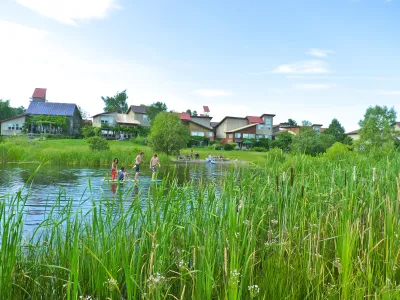Robert Boyer of UNC-Charlotte discusses his new article on the hurdles surrounding building environmentally friendly Ecovillages. Follow Journal of Planning Education and Research @JPER7.

Robert Boyer guest blogs about his new article in JPER, which is a case study of EcoVillage at Ithaca as an example of socio technical experimentation in planning and community building.
EcoVillage at Ithaca (EVI) is amongst the oldest and widely respected cohousing projects in the United States. Situated in the Town of Ithaca, New York, EVI consists of three tightly-clustered residential neighborhoods with direct access to over 100 acres of open space, two community-supported farms, and several independent businesses. The land consists of five parcels, each owned by a separate non-profit entity, and controlled by the consensus decisions of neighborhood inhabitants. A combination of energy-conserving design and cooperative, low-impact lifestyles results in measurably lower ecological footprints without sacrifice to quality of life. Indeed, residences in the project’s newest neighborhood are net-zero energy consumers, meaning they produce as much energy as they consume.
Perhaps most encouraging is that EVI’s educational non-profit, Learn@EVI, has teamed up with county planners to secure funding from the EPA’s Climate Showcase Communities program. The grant funding (awarded in 2010) is being used to replicate EVI’s successes in a mainstream market setting. To date, this has involved (1) the development of a zoning category that will facilitate future cohousing-style development in the region; (2) the recruitment of a residential development company that has embraced EVI’s model for a new affordable housing project in the Town of Ithaca; and (3) the monitoring of several existing cohousing cooperatives in the region.
What can planners learn from this encouraging episode? Firstly, this grassroots/municipal partnership did not emerge overnight. It has taken twenty-five years for EVI to evolve from a cross-continental activist march (1990), to an experimental housing development (1991-2000), to an important partner in Ithaca’s broad environmental community (2001-present), to a model for sustainable housing recognized by local, state, and federal government officials (2010-present). While EVI’s founders did not confront categorical opposition at the outset, they struggled for years to fit their idealistic vision into local land use regulations, legal vehicles for residential development, and typical financial models. Their project was, by many measures, non-rational and “niche”, requiring a disproportionate investment in time and resources. This leads to a second important lesson: successful climate mitigation is unlikely to be a rational-linear pursuit. Some of the most creative solutions may appear messy or imperfect precisely because what “makes sense” is often an outgrowth of an auto-oriented regime.
As communities nation-wide confront pressures and opportunities to lower carbon emissions, planners can benefit by collaborating with low-carbon initiatives that have existed, perhaps in the margins, for decades. There are hundreds of ecovillages and cohousing projects around the world engaged in willful experimentation in the built environment. Unfortunately, such projects often have no choice but to settle in remote rural locations, on cheap land with no zoning or building regulations, but most are working hard to spread the word. Perhaps the time has come for planners and other local officials to invite such willful experimentation into local planning processes.
The full article by Dr. Boyer can be found here:
Post Author: Robert Boyer.
Dr Boyer is Assistant Professor in the Department of Geography & Earth Sciences at the University of North Carolina at Charlotte, where he teaches courses in urban planning and sustainability. He is a recent Ph.D. graduate from the University of Illinois at Urbana-Champaign.

Analysis: Cybertruck Fatality Rate Far Exceeds That of Ford Pinto
The Tesla Cybertruck was recalled seven times last year.

National Parks Layoffs Will Cause Communities to Lose Billions
Thousands of essential park workers were laid off this week, just before the busy spring break season.

Retro-silient?: America’s First “Eco-burb,” The Woodlands Turns 50
A master-planned community north of Houston offers lessons on green infrastructure and resilient design, but falls short of its founder’s lofty affordability and walkability goals.

Test News Post 1
This is a summary

Analysis: Cybertruck Fatality Rate Far Exceeds That of Ford Pinto
The Tesla Cybertruck was recalled seven times last year.

Test News Headline 46
Test for the image on the front page.
Urban Design for Planners 1: Software Tools
This six-course series explores essential urban design concepts using open source software and equips planners with the tools they need to participate fully in the urban design process.
Planning for Universal Design
Learn the tools for implementing Universal Design in planning regulations.
EMC Planning Group, Inc.
Planetizen
Planetizen
Mpact (formerly Rail~Volution)
Great Falls Development Authority, Inc.
HUDs Office of Policy Development and Research
NYU Wagner Graduate School of Public Service




























